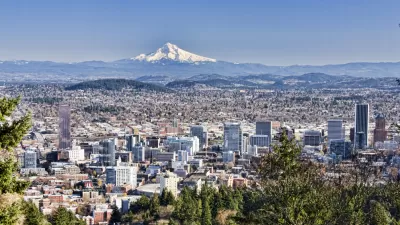A documentary focusing on Portland's urban growth boundary begins airing this month on public television stations across the country. It includes interviews with proponents on all sides of the smart growth issue.
The documentary is a collaboration between Northern Light Productions and the Lincoln Institute of Land Policy. "Portland has been a notable experiment in land use planning, and the film shows how challenging that can be," said Gregory K. Ingram, president of the Lincoln Institute of Land Policy. "The issues that come to life in the film - property rights, the value of land, density and transportation, planning and citizen participation - include many that we think cities all over the U.S. will need to confront." Following the passage of Oregon's landmark land use planning system in 1973, Portland established an urban growth boundary containing development within a 22-square-mile area, protecting surrounding farmland and open space; a regional governance system spanning 24 municipalities and three counties; and an ambitious system of light rail and streetcars to service more dense, compact, mixed-use urban form. Then, in 2004, after a state-wide campaign that raised questions about property rights and the fairness of the entire regulatory framework, voters passed Measure 37, which allowed development outside the urban growth boundary. A competing initiative, Measure 49, was then put on the ballot in 2008 to reverse those changes.
Incorporating historic footage of Portland as the self-proclaimed "City that Works," and recent interviews with city leaders and neighborhood residents during the battles over ballot measures on the land-use planning system, Portland: Quest for the Livable City is a cautionary tale for planning in the 21st century. As cities across the country today attempt to reduce greenhouse gas emissions, invest in transit, and focus on infill redevelopment as an alternative to car-dependent sprawl, the experience of Portland underscores a complex web of issues including economic development and jobs, gentrification, local food and farming, property rights, and civic participation."
FULL STORY: Portland: Quest for the Livable City, a Documentary Film Chronicling Struggle for Sustainablity, Debuts

Planetizen Federal Action Tracker
A weekly monitor of how Trump’s orders and actions are impacting planners and planning in America.

Maui's Vacation Rental Debate Turns Ugly
Verbal attacks, misinformation campaigns and fistfights plague a high-stakes debate to convert thousands of vacation rentals into long-term housing.

Restaurant Patios Were a Pandemic Win — Why Were They so Hard to Keep?
Social distancing requirements and changes in travel patterns prompted cities to pilot new uses for street and sidewalk space. Then it got complicated.

In California Battle of Housing vs. Environment, Housing Just Won
A new state law significantly limits the power of CEQA, an environmental review law that served as a powerful tool for blocking new development.

Boulder Eliminates Parking Minimums Citywide
Officials estimate the cost of building a single underground parking space at up to $100,000.

Orange County, Florida Adopts Largest US “Sprawl Repair” Code
The ‘Orange Code’ seeks to rectify decades of sprawl-inducing, car-oriented development.
Urban Design for Planners 1: Software Tools
This six-course series explores essential urban design concepts using open source software and equips planners with the tools they need to participate fully in the urban design process.
Planning for Universal Design
Learn the tools for implementing Universal Design in planning regulations.
Heyer Gruel & Associates PA
JM Goldson LLC
Custer County Colorado
City of Camden Redevelopment Agency
City of Astoria
Transportation Research & Education Center (TREC) at Portland State University
Jefferson Parish Government
Camden Redevelopment Agency
City of Claremont



























